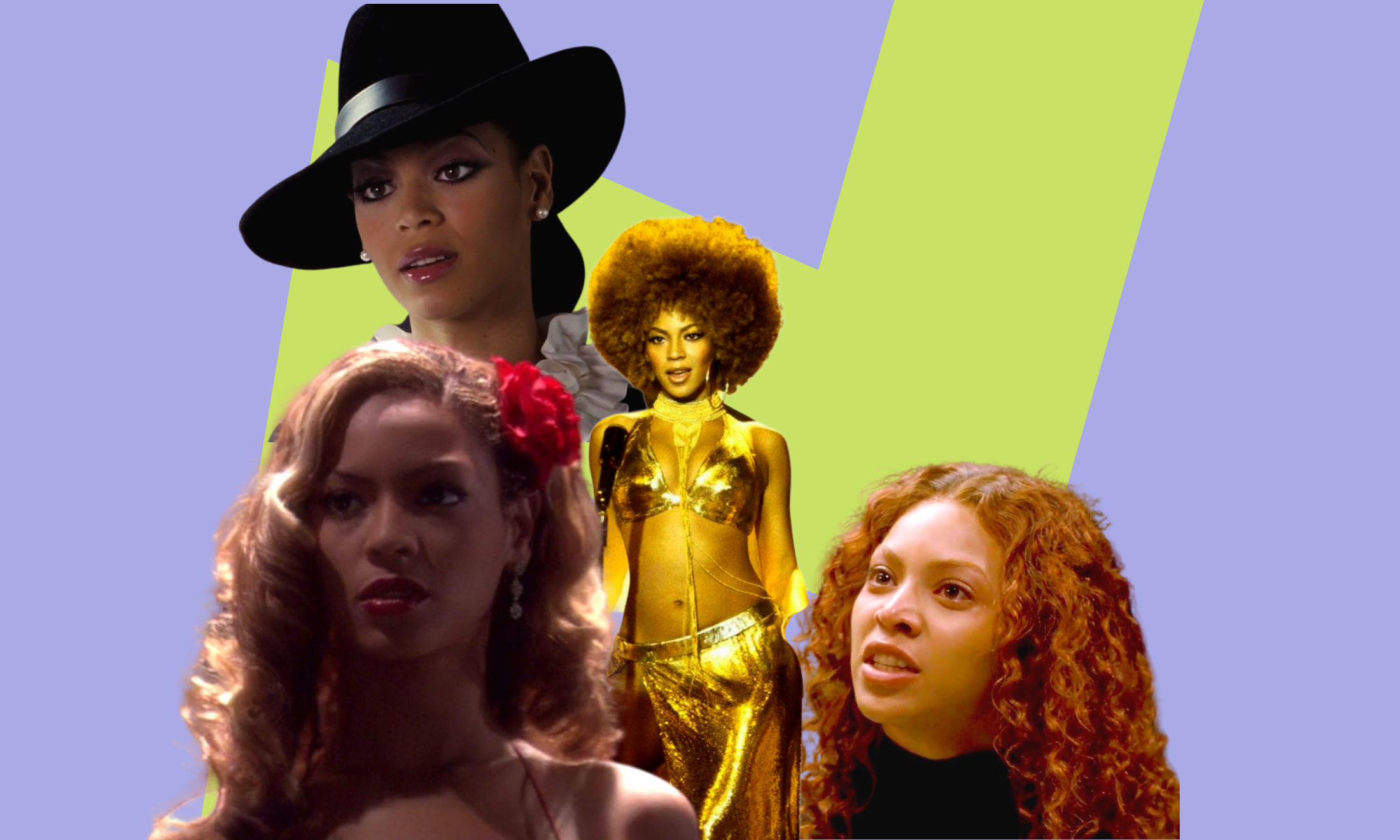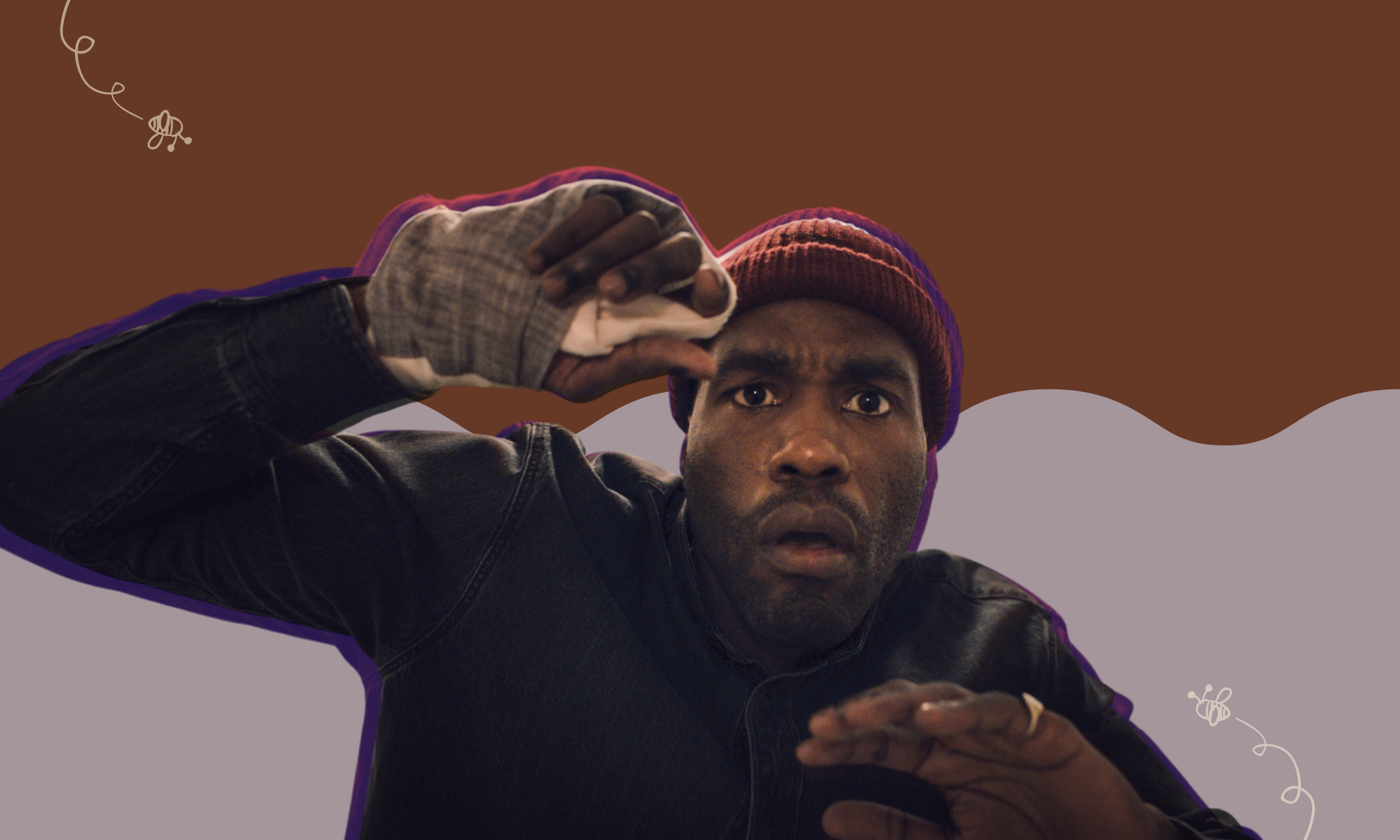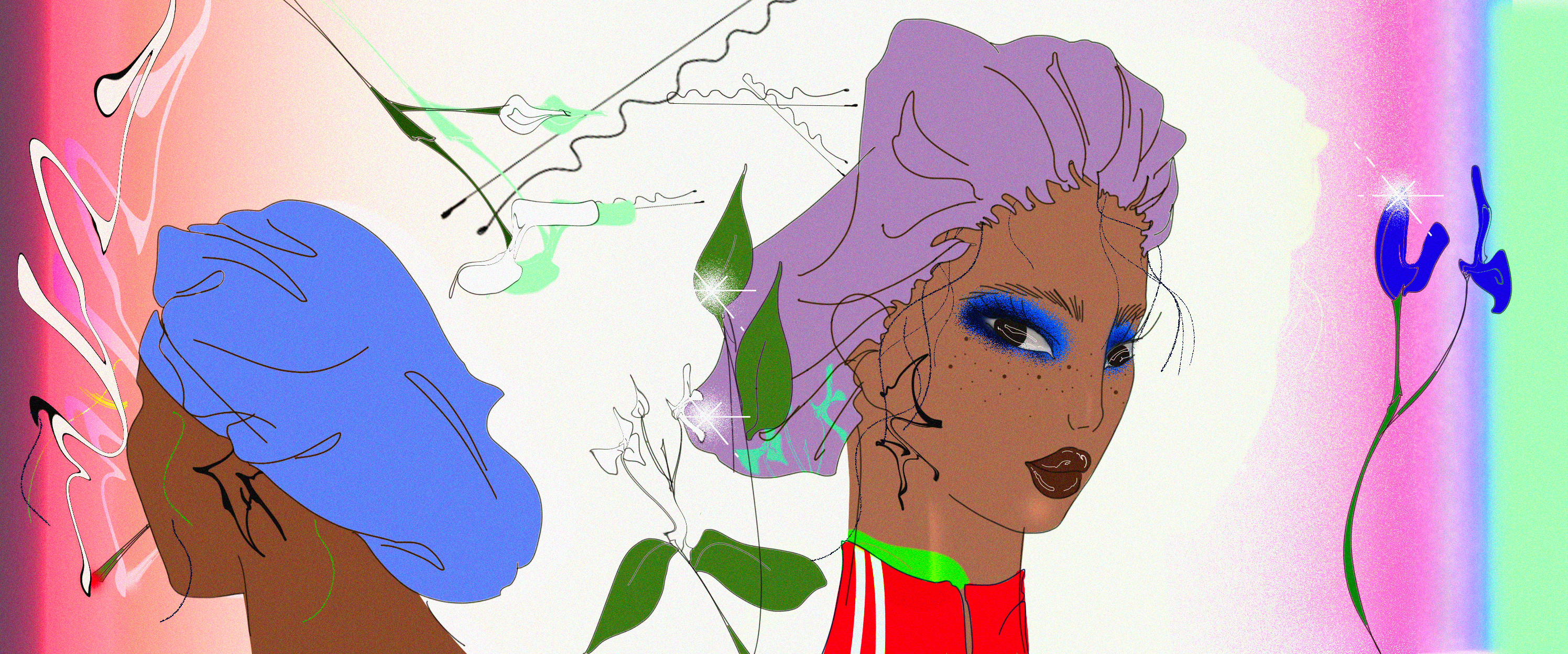Dua Saleh takes us back to school
Like their Sex Education character the musician-slash-actor has always fought for black queer Muslim and non-binary voices
Kemi Alemoru
29 Sep 2021
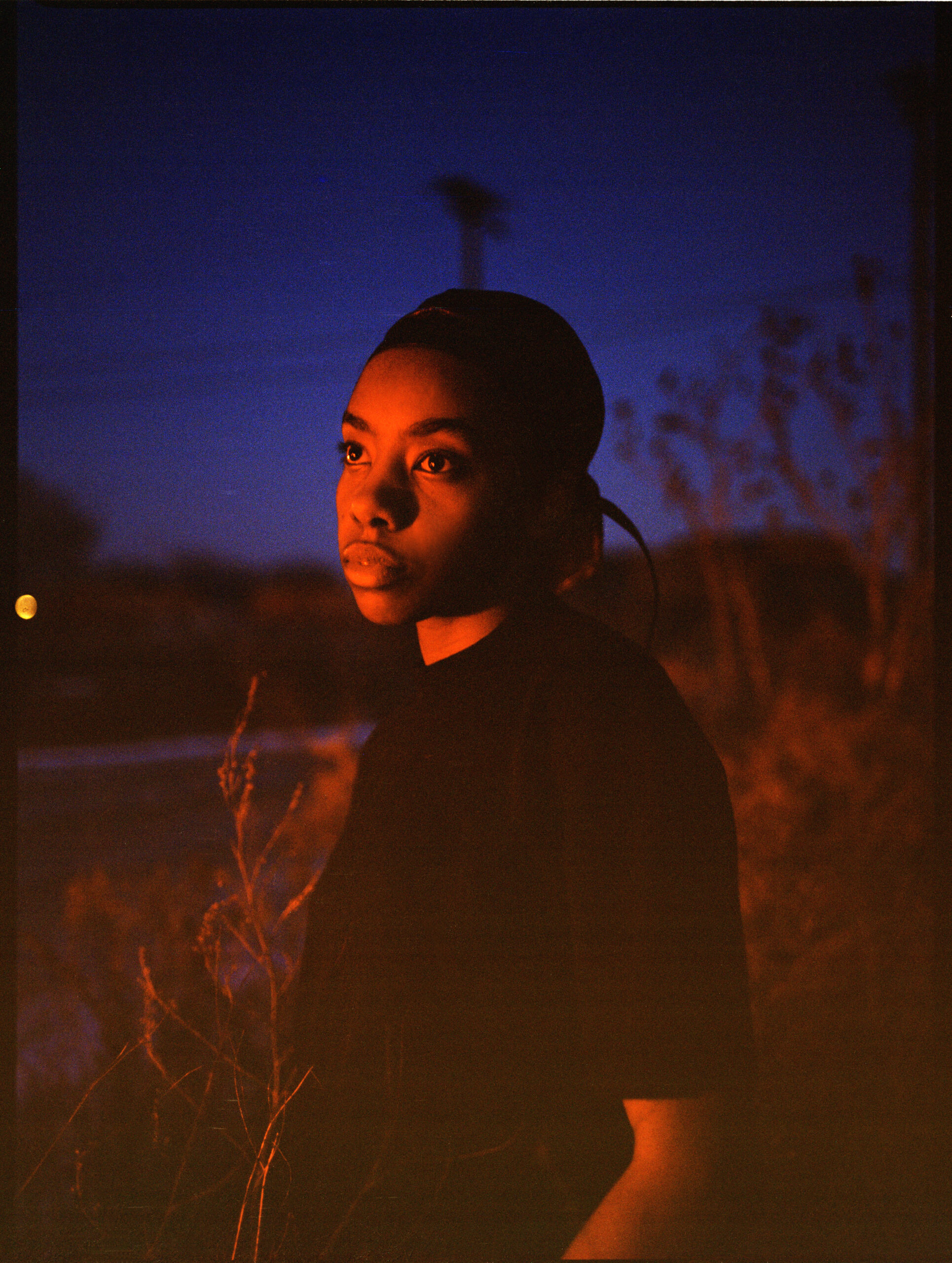
Photography by Izzy Comers
It doesn’t matter how old you get or whether you even have kids, September will always be known as “back-to-school” month, the end of summer and that return-to-reality feeling. But before you even have the chance to ask “Oh god, what have I got to live for now?”, Netflix has always had a way of filling the gaping holes we have in our lives. This month marks the return of the pupils of Moordale Secondary School in Sex Education, and a fresh face has joined the angsty cohort this year: a politically engaged, non-binary student named Cal, portrayed by Dua Saleh.
“I’m not gonna lie, I hadn’t watched it prior,” the newcomer admits over Zoom. In fairness, they’ve been busy. Outside of acting, the 25-year-old has made a name for themselves as an underground musician whose sound straddles pop and indie. Take idiosyncratic songs like ‘Warm Pants’, which mixes dark guitar strings, ethereal vocals and twitchy electronic tones and has garnered over 2.4 million Spotify streams. Meanwhile, Dua counts the likes of Yasiin Bey, SZA, Tierra Whack and Moses Sumney as fans of their live performances. They’re also a slam poet and act in local theatres, bringing queer narratives to the stage. So when the makers of the show went looking for an on-the-rise enby talent to join the ensemble, Dua got the call and set sail for the picturesque Welsh countryside.
“I thought [Sex Education] was for teens… for children actually. But when they reached out to me I watched and finished it in like three days. I’m not even saying this because I’m on the show but it was one of the best shows that I’ve ever watched,” Dua says excitedly. The streaming giant has a way of creating shows like Sex Education and Big Mouth, which are ostensibly about teenagers, but which actually help people who are old enough to know better navigate sex and relationships. But what makes Sex Education such a standout show is its ability to explore facets of identity and sexuality in an empathetic yet entertaining format.
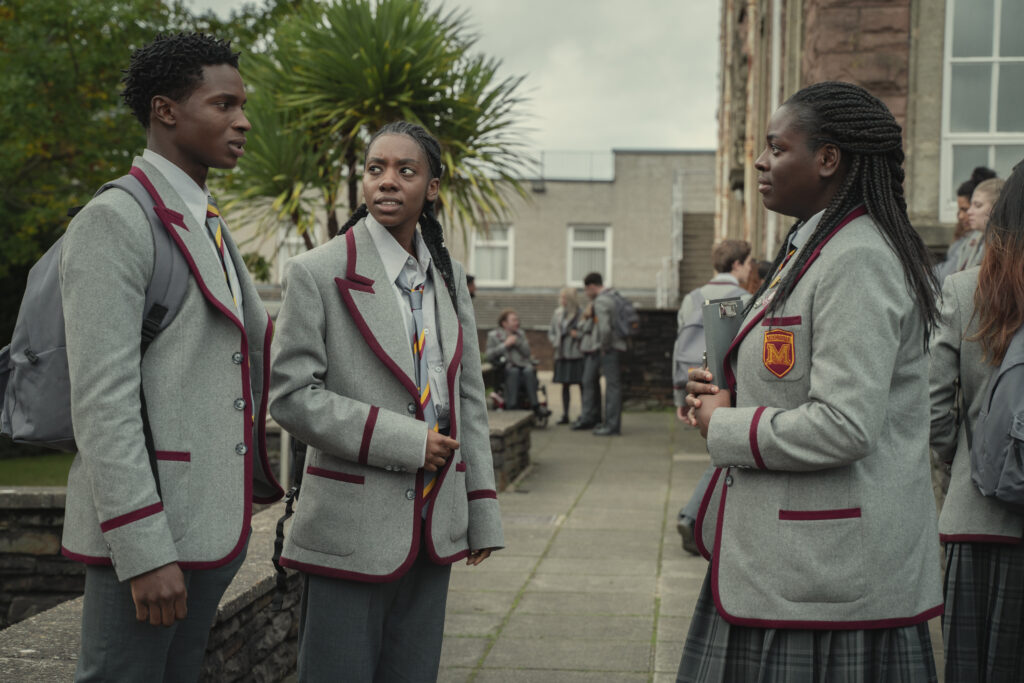
Photography by Sam Taylor, courtesy of Netflix
The story so far has followed them as they turn to an underground sex- therapy clinic in the disused toilets on the school grounds for help from a shy boy named Otis, whose mother is a sex therapist so he has absorbed her craft by osmosis. From orgasm difficulties and lack of sexual intimacy to anal, sexual assault and chlamydia, the pupils of Moordale are embarrassed, scared and confused. In the new season, Cal comes to Moordale at the same time as the new headteacher Hope, played by Jemima Kirke (AKA terrible, posh Jessa from HBO’s Girls).
When I connect with Dua, they’re at home in Minneapolis, Minnesota, and a little groggy from an early start. Behind them, there are two colourful pieces of artwork that adorn the walls. Dua loves art and visiting galleries, and admits they’re unintentionally drawn to artists romantically. One of the images is of a “three-tittied alien lady”, which is “probably the gayest” art they have in the house, while the other – a depiction of a goddess in the Ife religion – was a gift from a friend in college.
The conversation about art segues into life and their personal journey. Dua’s family fled the civil war in Sudan, spending four years in refugee camps in Eritrea until they were five years old. “I didn’t really think much of it just because I found kids to play with. I wouldn’t say I was enjoying, but there was music and art that I was experiencing,” they explain. There were some strained moments due to being a “displaced person”; however, being Tunjur (a nomadic ethnic group that inhabits Chad and Sudan) meant that moving around wasn’t too psychologically tumultuous. “That was part of my understanding of my ancestry.”
Mostly, Dua looks back at their youth traversing disparate geographies as a time of discovery. In Sudan they soaked up poetry, then Eritrean dance, noticing the country’s penchant for pentatonic runs in music. Having moved to America after they turned five and relocating several times up until their teen years they lapped up rap from the East Coast, and in Minneapolis, they attended live shows of rock, indie and “hella jazz and funk bands”. At their family home, Dua would listen to everyone from Beyoncé to the Sudanese vocalist Mohammed Wardi beloved by their parents with a cult following. “It all got stuck in my body. I wasn’t trying to do music, it just came out,” they say. Eventually, they saw music as a means to communicate.
“Cal and I both have a complex understanding of social hierachy, social power and control”
I quote some of my favourite lyrics from Dua’s discography like that of ‘Sugar Mama’, a song about a dalliance with a girl of another race (or so I assume based on the lyrics “Not used to girls with stringy hair/ I like them in a bonnet”). She has “persistent halitosis”, has been eating fruit but her “kitten smell like sausage”, leading Dua to declare through warped vocals: “All them pineapples a hoax/ That’s nasty/ That’s gross”. This is one of the few moments where Dua laughs through the morning fatigue. “Music is just about me, it’s an expression of self,” they say.
It’s not just the candid lyrics of lust and love that make them a perfect fit for one of the frankest shows right now. As well as being musical, Dua was a teen activist too, akin to their new character’s rebellious sensibilities. In high school, they were the vice president of the Gay-Straight Alliance. “I was resistant to power,” Dua says. “I was also doing a lot of organising work when I was in high school around the school-to-prison pipeline. I would do walkouts and protests that meant the principal did not necessarily like me as a person.”
Similarly, in season three of Sex Education, Dua’s character Cal ends up in a war against the new headteacher’s introduction of gendered uniforms and the suppression of LGBTQIA+ lapel pins. The bulldozing of the derelict toilets where the sex clinic once ran, in a quest to sanitise the school’s reputation, also presents a problem. It transpires they have been using the toilets as a space to get changed for PE away from the glare of mean girls who laugh at their chest binder.
“Cal and I both have a complex understanding of social hierarchy, social power, and social control,” they explain. But how did IRL Dua become so politicised? “Sudan is known for revolution just because they’ve had two civil wars. I was politicised at a young age, whether I wanted to be or not, just by being a refugee. You have to have a certain understanding of violence, genocide, and the powers that be in order for you to survive,” they say. “But I can also find cracks in the ground to find growth and nourish myself. Even though the system still exists and there’s still cement that surrounds me, I can still be fruitful and be authentically myself.”
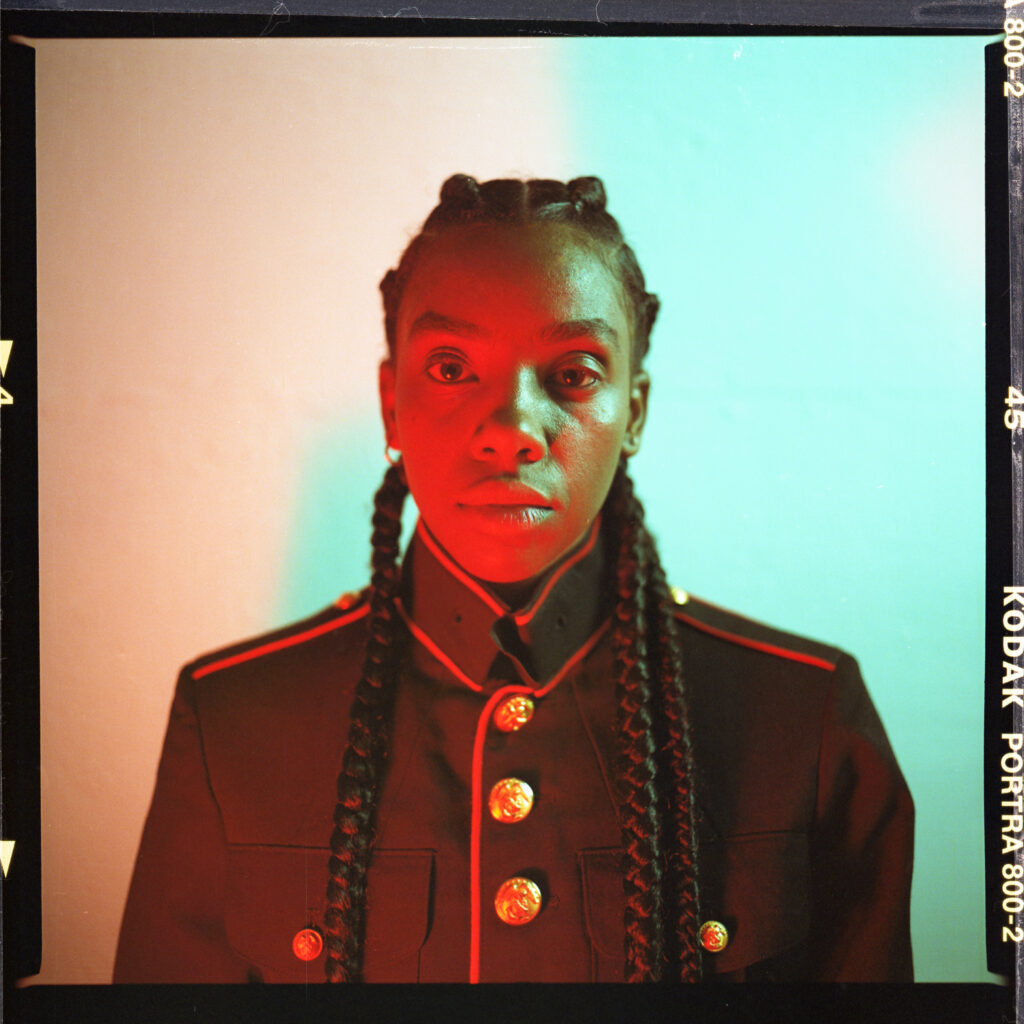
A few years ago, social media turned #BlueForSudan in memory of protestors killed in the capital, Khartoum. While this sort of clicktivism is heavily scrutinised and Dua’s advocacy at school favoured direct action (walkouts) they say online activism can “help build a narrative for people on the ground”. They highlight the way online traffic was suppressed during the Sudanese unrest, and other uprisings in the US, as an example of the power online conversations have. In the week of George Floyd’s death, they were isolating with covid-19 symptoms but using their social media channels to highlight the needs of protestors and dropped a song named ‘body cast’ about the violence – all proceeds were donated to the Black Visions Collective activist group. “There’s beauty in all different forms of organising,” Dua explains. “I think there are ways to do it that isn’t just trauma porn and that’s allowing people to understand the issues holistically.”
As well as being “serious”, Dua’s own schooldays in Minneapolis were “awkward”, and by their own admission they were a “very nerdy” child who “didn’t speak to many people”. Returning to a school setting in the middle of a pandemic in the UK was strange. They felt weirdly infantilised in the new grey Moordale attire (“I’m small but I’m grown – I’m literally the oldest person here”) but they did get to see some of “the most beautiful scenery [they had] ever seen”. Acting on school grounds was like life coming full circle, as high school was where they’d discovered their passion to entertain. “I started performing in the last year of high school,” they add “I was scared shitless. I’d shake every performance, but I also started getting a rush.”
“Even though the system sill exists and there’s still cement that surrounds me, I can still be fruitful and be authentically myself.”
It can’t be understated how significant it is to see the sorts of characters that Sex Education has introduced to the mainstream – ones that will empower young teens who are finding their voice like baby Dua. With a diverse range of ethnicities, sexualities and gender identities – the representation of the storylines is hard to fault. “It allows me to see the full breadth of everybody’s humanity through relatable experiences,” Dua says.
Through castmate Ncuti Gatwa’s portrayal of Eric, you see a coming-out narrative in a Christian African household where he is eventually accepted and loved for who he is. “Seeing somebody who was African [and] who was queer presented in media, I think was something that I don’t see often at all,” says Dua. They explain how the only other project they can compare their storyline to is Kenyan filmmaker Wanuri Kahiu’s “life-altering” 2018 Rafiki, which features dark-skinned lesbians who find lasting love – and which was banned in Kenya for its “homosexual themes”. As a first-generation East African refugee, Dua feels these affirming narratives are few and far between.
When asked whether the resonance of seeing African parents be supportive of their LGBTQIA+ children is based on their own coming-out experiences, Dua pauses. Despite these soul-baring lyrics, in our chat Dua keeps their cards close to their chest about a lot of potentially negative or traumatic moments. “Sudani people are very private people. My mom doesn’t even let me take photos of her on Instagram,” they explain. “I always have to cover her face with an emoji or use filters to obscure her face. I would like to respect that.”
During our conversation, it’s clear the actor and musician understands the power of art and narratives in poetry, theatre, television or social media as a conduit for queer expression, identity and freedom. Sex Education combines their passion for performing and queer storytelling. And while they may not be forthcoming about intimate details of their life in an interview setting, Dua is hoping to school others on the experiences of being a queer non-binary Black Muslim refugee through their art and now a rousing on-screen performance.
“[Sex Education is] a really radical show. Seeing what they had in mind for Cal shocked me as a trans person personally,” they say on what to expect from the upcoming season. “Some of the most integral storylines in modern-day are coming from this show. It literally took my breath away.”
Taken from gal-dem’s print issue The Roaring Twenties, on sale now. Sex Education is available to stream on Netflix.

